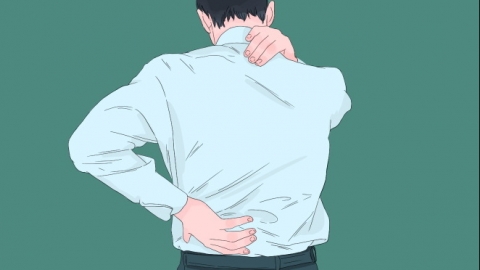What causes back pain when taking a deep breath?
In general, back pain upon deep breathing may be caused by muscle strain, poor posture, back fasciitis, pleurisy, costochondritis, and other reasons. It is recommended to seek timely medical attention, identify the cause, and undergo symptomatic treatment under a doctor's guidance. Detailed analysis is as follows:

1. Muscle Strain: Prolonged desk work or strenuous exercise can lead to tension and strain in the back muscles. Pain may occur during deep breathing due to muscle stretching. Rest adequately and avoid overexertion. Applying heat packs and massage can help relax the back muscles. After the pain subsides, appropriate stretching exercises for the back muscles may be beneficial.
2. Poor Posture: Long-term bending forward or slouching can cause muscle imbalance in the back. Pain may occur during deep breathing due to abnormal stress on the spine. Adjust daily posture, maintain a head-up and chest-out position, use a lumbar cushion during prolonged sitting, and choose a mattress of moderate firmness before bedtime to help maintain the physiological curvature of the spine.
3. Back Fasciitis: Inflammation of the back fascia may occur due to exposure to cold, dampness, or strain. Pain worsens during deep breathing due to fascial stretching. Patients may follow medical advice to use medications such as diclofenac sodium sustained-release tablets, celecoxib capsules, or ibuprofen sustained-release capsules to relieve pain.
4. Pleurisy: Inflammation of the pleura may be caused by viral or bacterial infection. Pain in the back occurs due to increased pleural friction during deep breathing. Patients should follow medical advice to use antibiotics such as amoxicillin capsules, cefuroxime axetil tablets, or ribavirin granules to control the infection. Vigorous activity should be avoided during treatment.
5. Costochondritis: Inflammation of the costal cartilage may occur due to trauma, infection, or other factors. Radiating back pain may occur during deep breathing due to chest expansion stimulating the affected costal cartilage. Patients may follow medical advice to use medications such as naproxen tablets, etoricoxib tablets, or eperisone hydrochloride tablets to relieve pain and muscle tension.
In daily life, keep the back warm to avoid cold exposure. Warm up properly before exercising to avoid sudden strenuous activity that may cause back injury. Diet-wise, appropriately increase intake of protein and vitamins to enhance the flexibility of muscles and bones and reduce the likelihood of pain episodes.









